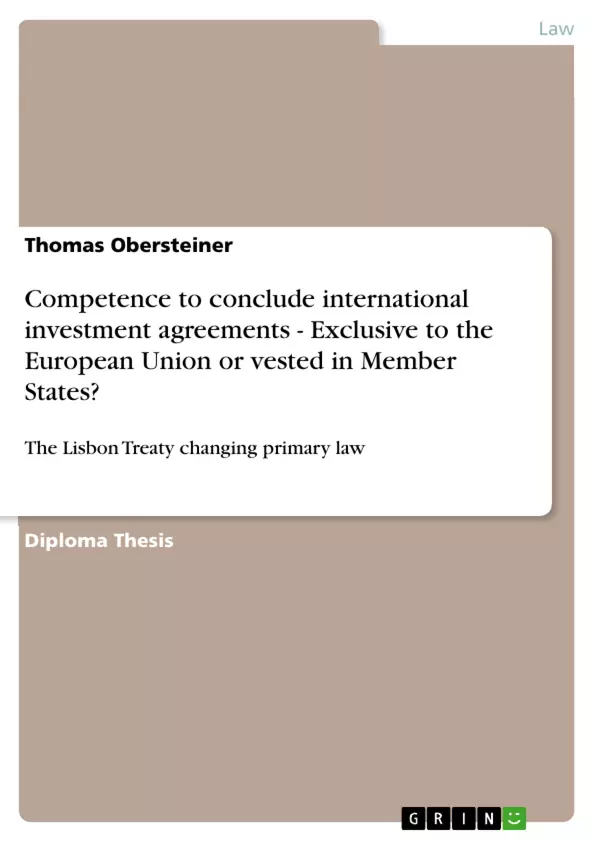The scope of the new Common Commercial Policy covers competence to conclude general obligations on the liberalization of capital transfer with relation to FDI and establishment. It is not limited to the market access phase. However, provisions concerning portfolio investment and minority participations in enterprises are not covered. It remains uncertain whether the new wording enables the EU to include policies to protect against expropriation and dispute-settlement clauses in its agreements. Although the Reform Treaty confers considerable competences to the EU, major parts of common Bilateral Investment Treaties do not fall within the scope of the new CCP. Hence, the Member States may continue to conclude their own specific agreements while the EU obtains more flexibility in negotiations and strengthens its position on the international scene.
Additionally, the Lisbon Treaty slightly strengthens the power of the European Parliament.
Inhaltsverzeichnis (Table of Contents)
- I. The Lisbon Treaty - General Introduction
- a) Reform of the Union - a long and tricky road..
- b) Contractual Basis after the ToL....
- c) Legal Personality of the European Union..
- d) The new Foreign Direct Investment Competence.…….......
- II. Investment......
- a) Foreign Direct Investment..
- b) Portfolio Investment
- c) Market Access- and Post Market Access Phase..
- d) Investment Protection Instruments
- III. Investment Activities of the Member States......
- a) Bilateral Investment Agreements....
- b) Key Common Provisions of BITS.
- IV. Investment Competences of the EU/EC
- a) Foreign Investment Competence in the Treaties and in Case-Law..
- b) Common Commercial Policy (CCP), Art. 133 EC-T.
- c) Freedom of Establishment, Art. 47(2) and Art. 48 EC-T.
- d) Freedom of Capital and Payment.
- e) Mixed Agreements
- f) Investment Provisions in existing Agreements....
- V. The Reform of the CCP……………….……………………………….
- VI. The Scope of FDI in Art. 207 TFEU………………..\n
- a) Covered Types of Investment..
- b) Covered Stages of Investment.
- c) Covered Investment Protection Instruments...
- d) Protection against Expropriation........
- e) Dispute Settlement
- f) General Limitation by Art. 207 (6) TFEU.
- VII. Procedures and Voting...…………………………….\n
- a) Framework-Regulations and Negotiation Procedure..
- b) Voting Rules.
- VIII. Consequences and Conclusion.........
Zielsetzung und Themenschwerpunkte (Objectives and Key Themes)
This paper examines the legal framework governing the European Union's competence to conclude international investment agreements, specifically in the context of the Lisbon Treaty. It analyzes the interplay of EU competence and the competences of individual member states within the area of foreign direct investment.
- The impact of the Lisbon Treaty on EU competence in foreign direct investment
- The legal framework for EU competence in international investment agreements
- The interplay between EU competence and Member State competences in this area
- The scope of foreign direct investment within the context of Article 207 TFEU
- The procedures and voting rules for the conclusion of international investment agreements.
Zusammenfassung der Kapitel (Chapter Summaries)
The paper begins with a general introduction to the Lisbon Treaty and its implications for the European Union's competence to conclude international agreements. It then discusses the concept of foreign direct investment and its different forms, as well as relevant investment protection instruments. The work goes on to explore the investment activities of member states, including bilateral investment agreements and their key common provisions. The focus then shifts to the EU's investment competences, analyzing the legal basis for its competence in treaties and case law, as well as the role of the common commercial policy, freedom of establishment, and freedom of capital and payments. The paper examines the implications of the reform of the common commercial policy and the scope of foreign direct investment as defined in Article 207 TFEU. Finally, it addresses the procedures and voting rules involved in the conclusion of international investment agreements.
Schlüsselwörter (Keywords)
The core themes and concepts explored in this paper include the European Union, international investment agreements, foreign direct investment, competence, legal framework, Treaty of Lisbon, member states, common commercial policy, freedom of establishment, freedom of capital and payments, Article 207 TFEU, procedures, and voting rules.
Frequently Asked Questions
Does the Lisbon Treaty give the EU exclusive competence over all investments?
No. While the EU gained significant competence over Foreign Direct Investment (FDI), areas like portfolio investment and certain protection instruments often remain within the shared or national competence of Member States.
What is the significance of Article 207 TFEU?
Article 207 TFEU integrates FDI into the Common Commercial Policy (CCP), expanding the EU's power to negotiate international investment agreements.
What is the difference between FDI and portfolio investment in this legal context?
FDI involves a lasting interest and control in an enterprise, which is now an EU competence, whereas portfolio investment involves smaller shares without control, which is not clearly covered by the new CCP.
Can EU Member States still conclude their own Bilateral Investment Treaties (BITs)?
Yes, Member States may continue to conclude specific agreements for parts not falling under the EU's exclusive competence, though the EU's role has been significantly strengthened.
How does the Lisbon Treaty affect the European Parliament's role in investment?
The Lisbon Treaty slightly strengthens the power of the European Parliament by involving it more closely in the legislative process regarding the common commercial policy.
- Citar trabajo
- Thomas Obersteiner (Autor), 2008, Competence to conclude international investment agreements - Exclusive to the European Union or vested in Member States?, Múnich, GRIN Verlag, https://www.grin.com/document/163255



